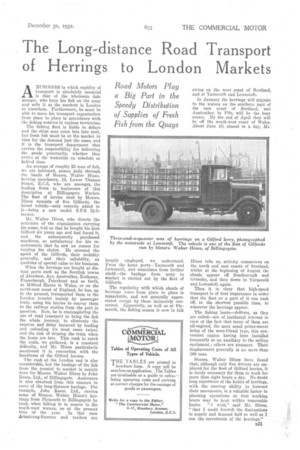The Long-distance Road Transport of Herrings to London Markets
Page 45

If you've noticed an error in this article please click here to report it so we can fix it.
ABUSINESS in which rapidity of transport is absolutely essential is that of the wholesale fishmonger, who buys his fish on the quay and sells it at the markets in London or elsewhere. Furthermore, he must be able to move his transport organization from place to place in accerdance with the fishing seasons in various territories.
The fishing fleet is liable to delays and the ships may come late into port, but fresh fish must be at the market in time for the demand just the same, and it is the transport department that carries the responsibility for delivering the goods punctually, whether they arrive at the waterside on schedule or behind time.
An average of roughly 25 tons of fish, we are informed, passes daily through the hands of Messrs. Walter Hines, herring merchants, 10, Lower Thames Street, E.C.3, who are amongst. the leading firms in businesses of this description at Billingsgate Market. The fleet of lorries used by Messrs. Hines consists of five Gilfords, the latest vehicle—only recently added to It—being a new model S.17.6 2i-3. tonner.
Mr. Walter Hines, who directs the activities of the organization carrying his name, told us that he bought his first Gilford six years ago and had found it, and the subsequently purchased machines, so satisfactory for his requirements that he saw no reason for varying his choice. He stressed the speed of the Gilfords, their mobility generally, and their reliability, as qualities of special value to his business.
When the herrings are bought at distant ports such as the Scottish towns of Aberdeen, Ayr, Anstruther, Rothesay, Fraserburgh, Peterhead and so forth, at Milford Haven in Wales, or on the north-east coast of England, he has, up to the present, transported them to the London termini mainly by passenger train, using his lorries to convey them to the railway station from the port in question. Now, he is contemplating the use of road transport to bring the fish the whole journey, to eliminate the expense and delay incurred by loading and unloading (in most cases twice) and the risk of missing the train when the boats are late. This rush to catch the train, we gathered, is a constant difficulty, and Mr. Hines particularly mentioned it in connection with the handiness of the Gilford lorries.
The rush at the London end is also considerable, but the haulage of the fish from the termini to market is mainly done for Messrs. Walter Hines by John Reece, Ltd., of Billingsgate. Assistance is also obtained from this concern in some of the long-distance haulage. For example, John Reece, Ltd., carries some of Messrs. Walter Hines's herrings from Plymouth to Billingsgate by 'road, when fishing is in season in the south-west waters, as at the present time of the year. In this case Armstrong-Saurers and trailers are largely employed, we understand. From the home ports—Yarmouth and Lowestoft, and sometimes from farther afield—the haulage from quay to market is carried out by the fleet of Gilfords.
The regularity with which shoals of herrings move from place to place is remarkable, and not generally appreciated except by those intimately concerned. Apparently, as well as at Plymouth, the fishing season is now in full Hines tells us, activity commences on the north and east coasts of Scotland, whilst at the beginning of August the shoals appear off Scarborough and Grimsby, and then down to Yarmouth and Lowestoft again.
Thus it is clear that high-speed transport is of first importance in order that the fleet or a part of it can rush off, in the shortest possible time, to wherever the herrings appear.
The fishing boats—drifters, as they are called—are of incidental interest in view of the fact that many of them are oil-engined, the most usual prime-mover being of the semi-Diesel type, this convenient engine having been installed frequently as an auxiliary to the sailing equipment ; others are steamers. Their displacement generally is no more than 100 tons.
Messrs. Walter Hines have found that, although only five drivers are employed for the fleet of Gilford lorries, it is rarely necessary for them to work for more than eight hours a day. No doubt long experience of the habits of herrings, with the ensuing ability to forecast their movements, is a valuable factor in planning operations so that working hours may be kept within reasonable " I wish," said Mr. Hines, " that I could foretell the fluctuations in supply and demand half so well as I can the movements of the herrings." 1331




























































































